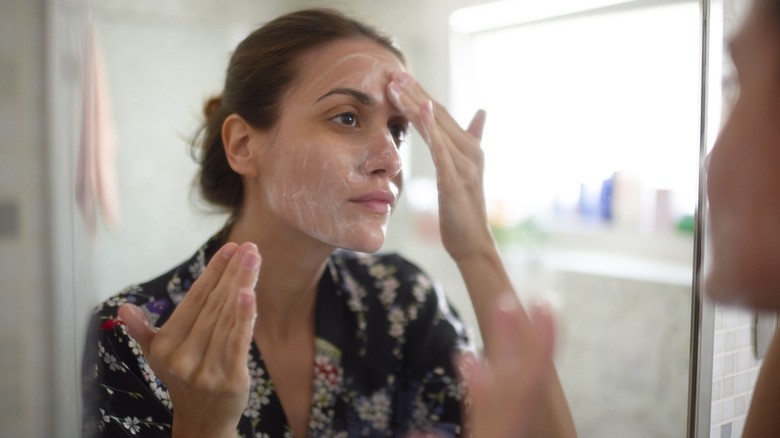Is Fragrance-Free Skincare Really Better For You? Inside The Debate
If you're someone whose big on preserving skin health, you've probably been told to avoid skincare that contains fragrance. And chances are, one big reason for that was because medical-grade skincare products, which are heralded as the best of the best, are often fragrance free. But is fragrance-free actually any better for your skin?
Before we get into it, there are a couple key definitions to know. The first is that there are technically two kinds of fragrances that can be added to skincare; synthetic and natural. Synthetic fragrances are man-made smells that are usually developed to be more long-lasting, while natural fragrances are scents found in nature that may fade quickly (think things like flowers or fruits). Both types are capable of triggering allergies.
The second thing to know is that fragrance-free doesn't actually mean the same thing as unscented. If a product claims to be 'unscented,' it simply won't have a noticeable scent. But that doesn't necessarily mean extra chemicals haven't been added to neutralize smells from its other ingredients to make it odorless. 'Fragrance-free,' on the other hand, means the product doesn't contain any natural or synthetic fragrances at all. But now we've got that out the way, let's dive into what exactly is the big deal with fragrances in skincare.
Fragranced skincare may not cause skincare issues, but it can worsen them
Those who are anti-fragrance insist that the ingredients used to make fragrance are bad for your skin. However, there doesn't seem to be any concrete research to suggest fragrance in skincare can necessarily cause any serious skin issues. But it can irritate existing problems. Cosmetic chemist Dr. Shuting Hu explained to Byrdie that people with inflammatory skincare issues, such as hyperpigmentation, dark spots, or sensitive skin avoid fragranced skincare, as it could exacerbate these problems.
Dermatologist Dr. Nikhil Dhingra explained to TZR that anyone with fragrance allergies should, of course, also steer clear of fragrances products. "Fragrances carry a high risk of allergy and irritation, potentially triggering unwanted reactions, itching, swelling, redness, peeling, and breakouts," he shared. "[Fragranced skincare] can [also] strip the skin of its natural fatty barrier, leading to a higher risk of generating reactions to other potential allergens you might not have been sensitive to before," he added.
You may also want to leave the fragranced products on the shelf if you have a sensitive nose, as fragranced products may result in a whole lot of sneezing. Not only that, but a 2010 study suggested some people who experience migraines have found they can potentially be triggered by smells and, well, some would argue it's maybe just not worth the risk when there are so many fragrance-free products on the market.
Fragrance is a very broad term in the skincare world
Another reason so many people take issue with skincare containing fragrance is because the term is just so broad. As aesthetic doctor Dr. Parisha Acharya told Refinery29, "Fragrance is an umbrella term for a cocktail of ingredients used by the cosmetics industry to scent products and they may be natural or synthetic." As companies can simply use the world fragrance on the ingredients listing without having to expand on exactly what each ingredient is, that means you may never know exactly what's in the products you're using. And if that's going on somewhere as important as your face, that's not exactly good for you.
You may even find yourself in a moral dilemma if you don't know exactly what's in what the products you're using. Clean cosmetic chemist Krupa Koestline explained to InStyle, "[Fragrance] includes synthetic fragrances, animal-derived fragrances (animal derived musks, ambergris (as a stabilizer) from sperm whales' digestive system), insect-derived fragrances, and natural fragrances." Arguably, these are things people should be made aware of before applying them to their skin so they can make an informed decision.
But they're not the only reasons why the fragrance vs. fragrance free debate is a little heated. Dr. Acharya noted if a company is using natural scents in its product, it could potentially be marketed using the clean beauty buzzword — despite the fact it could still easily cause irritation to the skin. And that in itself can cause an issue.
But not everyone necessarily has to avoid fragranced skincare
Although many dermatologists would recommend sticking to fragrance-free skincare to be safe, that doesn't necessarily mean you need to throw out all your scented products. If you've been using fragranced products for years with no side effects, you're probably fine to continue using them. Particularly if you're using them on your body rather than your face, as a 2019 study found face skin tends to be perceived as more sensitive. Though Dr. Dinghra told TZR he'd recommend fragrance-free products, he noted, "If you have heartier skin that can handle more than those with sensitive skin, you can give perfumed products a trial."
Of course, when deciding whether to buy a product, it's worth remembering that fragrance serves no skincare-related function. But while there's really no health benefit to buying a fragranced version of a product, they may be of interest if you're put off by unpleasant smells. And who wants to be putting bad smells close to their nose? As dermatological nurse Natalie Aguilar told Byrdie, "For some, scents can be nostalgic, calming, or even make us feel cleaner. They are used to combine all senses and give us that feel-good mood." Plus, a fragranced product can also seem more luxurious and indulgent, and we all deserve a treat and pick me up once in a while. The bottom line though is to be smart about what you're putting on your skin and always see a dermatologist if you notice irritation.



